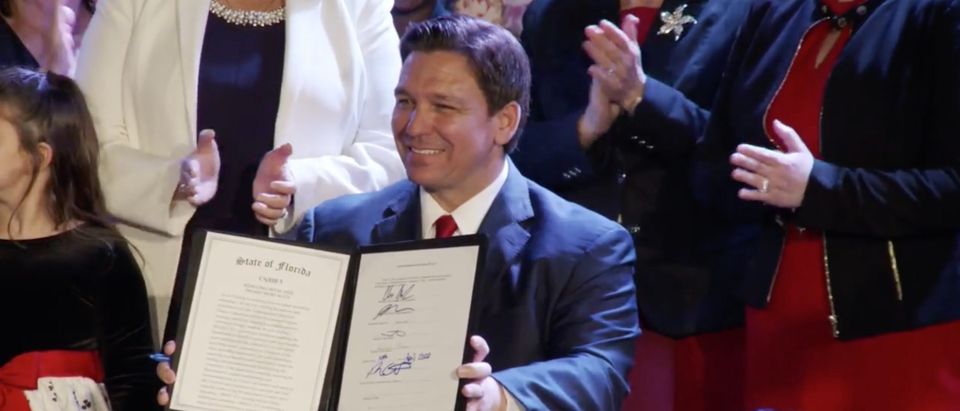Editor’s note: We endeavor to bring you the top voices on current events representing a range of perspectives. Below is a column arguing that more states should adopt policies that promote fatherhood like the one recently signed by Florida Gov. Ron DeSantis. You can find a counterpoint here, where the Reason Foundation’s Max Gulker argues that the law is based on a failed big government model of alleviating poverty.
Every day, I marvel at one of my coworkers. Equipped with a Ph.D., a strong moral code and a healthy dose of bravery, he goes toe to toe with lawmakers at the Virginia state capitol to improve the lives of countless Virginians. When I see him eat an apple a day, literally, and then go straight from work to coach a sports team at his child’s school, I am impressed. When I meet the teenager he and his wife took out of the foster care system and adopted into their family, I am grateful. And I can’t help but ponder the fact that he must have an amazing mother. You see, his dad died a tragic death when he was just eighteen months old.
The product of a heroic single mom, my coworker defies the odds. Studies show a child without a father is four times more likely to end up in poverty. A fatherless child is also twice as likely to drop out of high school, let alone go on to college and achieve a terminal degree. In fact, 70% of high school dropouts don’t have a dad at home. That number doesn’t include all the children who are no longer living at home. Ninety percent of runaway children are from fatherless homes.
In a small effort to help break the cycle of fatherlessness, Republican Florida Gov. Ron DeSantis recently announced an initiative that can, hopefully, make a dent in some of those numbers. Can DeSantis succeed when so many government programs in the past have failed or actually made the fatherless crisis worse?
While family, community and houses of faith strive to be the net that preserves fatherless children, too often the government will become their primary means of assistance through food stamps, housing, medical care and, unfortunately, the criminal justice system.
Even with all the government support, most fatherless boys will not end up like my co-worker, with an advanced degree and healthy, happy children of their own.
Much of the blame lies at the feet of our culture. While it is right to identify and vilify bad-acting men, the oft-promoted concept of “toxic masculinity” seems to have conflated the best men have to offer with the worst. When strength and chivalry are lumped in with abuse and dominance, what remains is men who have no sense of duty or responsibility for the well-being of their wife and children.
Similarly, while women’s empowerment rightly identified inequalities between the sexes existing in the workplace, our iconic model of the woman who does it all, all by herself, has helped no one, especially not the children whose fathers walk away because they seem unnecessary.
We can thank our 1960s “Great Society” government programs for helping to lay the groundwork for this culture shift. For decades, welfare programs favored the fatherless home, thus contributing to more fatherless homes. But more recent government decisions are also to blame. For example, in Virginia, our new Attorney General Jason Miyares learned upon taking office that child support payment enforcement had been shut down under his predecessor in the name of “equity.” Given the overwhelming social science on fatherlessness, giving a free pass to dads to walk away from children might possibly be the least equitable choice a government can make.
Both President Obama and President Trump acknowledged the toll fatherlessness takes on our society and worked to ameliorate it. They recognized that the studies revealing poorer outcomes for fatherless children do not come from right wing institutions alone. They come from Harvard, Princeton and the University of Virginia.
Whether red state or blue, the social costs of absentee dads are the same, but solutions vary.
DeSantis has chosen a path less traveled by allocating $70 million towards equipping dads and resourcing children who find themselves in a fatherless home through no fault of their own. DeSantis knows government cannot fix family fragmentation, but since it has contributed to the problem, it ought to be part of the solution.
Even proponents of limited government can applaud employing preventative funds that will decrease future tax dollars spent on overcrowded prisons or welfare programs. Part of the funds allocated by DeSantis will go to incentivizing mentorship. What if the best men we have would not only raise their own healthy kids but help other fatherless children in their extended families or communities? Then we might have a shot at stopping the cycle of children living in fatherless homes becoming absentee dads themselves.
The success story of my coworker becomes more broadly available to others because a big part of his story is his heroic mom finding male mentors to help shape him into the man he is today. Governors around the nation would do well to take DeSantis’ lead and focus on permanently changing the trajectory of kids for the benefit of future generations.
Victoria Cobb is the president of the Family Foundation.


